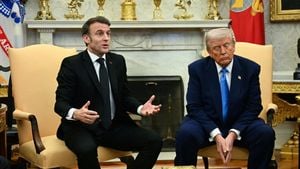The Palestinian Authority (P.A.) chief Mahmoud Abbas’s Fatah Party is making strides to integrate prisoners released under the recent hostage deal with Hamas back 'into the movement and national frameworks.' This was announced last Saturday during the Fatah Revolutionary Council's annual summit held in Ramallah, where leaders reiterated their commitment to supporting the families of martyrs, prisoners, and injured individuals. They were described as 'heroes of freedom' who deserve top priority for protection and care, as reported by the P.A.’s official Wafa news agency.
With hundreds of Palestinians—including convicted murderers and terrorists—freed from Israeli prisons as part of this deal, the Fatah Revolutionary Council vowed to 'double its efforts' to support these released prisoners. Their statement concluded with the rallying call, 'Mercy for the martyrs, freedom for the prisoners and healing for the wounded.'
During the Revolutionary Council meeting, Abbas articulated pride for those who have sacrificed for their freedom: 'We reiterate we are proud of the sacrifices of the martyrs, prisoners and wounded.' He elaborated on the establishment of 'a comprehensive social protection and care system' aimed at assisting all categories of Palestinian families needing help, emphasizing the government’s role to 'preserve their dignity and material needs.' This system also signals the P.A.’s intention to amend certain laws to bolster its support.
The reception for the released prisoners took place over the weekend in the suburb of Al-Bireh, attended by Zakaria Zubeidi, who was released under the hostage deal on January 30. Zubeidi, known for his role as commander of the Fatah Al-Aqsa Martyrs Brigades, expressed his sentiments about the prisoners' sacrifices: 'We went to prison so the people could gain their freedom, and it is time, after all the great sacrifices they have made, for them to be able to do so by establishing their independent Palestinian state with Jerusalem as its capital.'
This effort to integrate released prisoners happens as the P.A. is reportedly being positioned to take over the governance of Gaza from Hamas, should negotiations on ceasefire and governance progress. A source within Hamas asserted their acceptance of P.A. authority, alluding to potential cooperation with U.S. and Israeli interests, contingent on significant reforms by the P.A.
Abbas announced what appeared to be the end of the controversial 'pay-to-slay' scheme—financial rewards for those convicted of violent acts against Israelis—indicating new financial assistance to be provided based on the needs of families rather than the severity of crimes. This billows out following widespread public support for these payments, which had reached 91% approval, according to prior polls.
Interestingly, Israeli Prime Minister Netanyahu's office swiftly rejected the narrative advocating for P.A. governance over Gaza, with Netanyahu supporting alternatives, including U.S. President Trump’s controversial suggestions about U.S. oversight of Gaza and resettling its population.
Meanwhile, Oran Almog, who is now blind after being injured by one of the Palestinians released under the hostage deal, shared his thoughts with the Jewish Chronicle. He expressed support for the overall agreement, emphasizing it grants hostages and their families the opportunity to 'live life again,' reflecting the complex human dimensions of this political drama.
Overall, the integration of released prisoners signals not just political maneuvering within the P.A. but also the broader societal expectations of the Palestinian populace about embracing those who have lived through the intense struggles and violence resulting from the protracted conflict.



